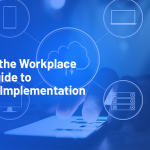How Can ERP Solutions Improve Business Operations?
In today’s market, companies are looking for strategies to help them maintain their competitive advantage by becoming more inventive, profitable, and competitive. To do so, they are adopting Enterprise Resource Management (ERP) solutions to keep up with the ever-changing demands of the 21st-century business environment. An ERP system stands for enterprise resource planning and functions as an all-in-one business software suite for companies of every size and industry.
Companies can get a unified view of business operations as this system stores all business data in a single database alongside financials and other important information. When it comes to data centralization, the benefits are multifold. Read this blog post to learn all about ERP, the significant reasons businesses use it, and how it can benefit exponential business growth.
Enhancing Data Accuracy and Accessibility
You can finally say goodbye to spreadsheets with an integrated business system like ERP, which can connect your entire shop with a single database. You can handle employee records, payroll, hiring, performance reviews, sales, and inventory management from a particular location. With its automated data entry and validation processes, you can also increase data accuracy and lower the possibility of human error. This high accuracy paves the way for reliable analytics and can be confidently used for decision-making. To access the data from anywhere, opting for a cloud-based ERP system is the right choice. This approach facilitates remote work and real-time data access, offering scalability and flexibility.
Boosting Customer Relationship Management
The integration of ERP systems into business operations has a profound impact on customer relationship management. At its core, ERP systems provide a holistic view of customer interactions by consolidating customer data. It includes everything from purchase history, customer feedback, and communication records to create more personalized offerings. In addition to that, the system has the potential to streamline various customer-interacting processes by automating them, such as order tracking and updates, billing, and after-sales service. Also, customer experience will be enhanced when they get timely and accurate purchase information.
Optimizing Inventory Management and Supply Chain Operations
ERP systems offer another significant aspect: their ability to optimize resource management. The inventory management module of ERP systems allows you to track inventory levels in real-time to prevent stockouts. With the latest information, you know exactly what raw materials you have or what more you need to complete a job. This step not only makes manufacturing operations more efficient but also makes financial reporting more accessible. As for its role in Supply Chain Operations, companies can easily coordinate and streamline the complex chain of activities. From demand planning to turning raw materials into finished products to deliver them to customers, an ERP system helps manage and optimize every step of the process with automation.
Improving Financial Management and Reporting
An ERP system is a fully integrated system. It means you can manage your entire business from a single system. With its unified system, an ERP eliminates the need to cross-reference and re-enter data into multiple systems, saving you time and money. In terms of financial management, the system can automate and streamline financial transactions, planning, and analysis. The functions also cover general ledger, treasury, tax, budgeting, and reporting. This automation ensures a higher degree of accuracy. This way, your report is free from upload, input, and po10tial timing errors, allowing you to efficiently handle the core fundamental back-office functions.
Facilitating Regulatory Compliance and Risk Management
Enterprise Resource Planning systems are among the most critical business instruments for guaranteeing legal compliance and efficient risk management. Business owners can handle complex regulatory standards and mitigate various business risks with the help of ERP solutions, establishing a solid foundation for sustainable growth. ERP systems provide an integrated framework for monitoring financial activities and ever-changing regulatory requirements across different industries and regions. For example, you can set up the system for notification if it detects disruptions in supply chain operations, irregular financial reporting, or cybersecurity threats, protecting companies from potential pitfalls.
Conclusion
By investing in an ERP system, your business can look forward to a future of enhanced efficiency. So don’t miss out on this valuable opportunity to join the team of Untitled 10 if you are looking at selecting an ERP system for error-free resource planning. Contact us today to learn more about how our ERP solutions can help you with your digital transformation journey.
What is an ERP system, and how does it work?
ERP systems, or enterprise resource planning, are a category of business management software. They collect information from various departments, such as finance, manufacturing, inventory and order management, customer communication, sales and marketing, project management, and human resources, and store it in a common database. The main function of the ERP system is to automate these business processes and serve as a shared database.
How can ERP solutions help in improving business efficiency?
As a forward-looking approach, businesses should enhance their day-to-day business activities using ERP solutions for improved business efficiency. Some of the ways are:
- With this technology, you can monitor the workflow and financial performance through built-in reports to deliver quality results.
- You can have access to real-time information across all the different departments.
- It helps identify and evaluate the risks and provide appropriate responses for them.
What are the key features to look for in an ERP solution?
Here are some features you need to look out for when choosing an ERP system for your business. It must have:
- Modules for managing finance, human resources, supply chain operations, inventory, sales, and customer relationships
- Ability to seamlessly integrate with other business applications or tools.
- Real-time reporting and analytics for better decision-making.
How long does it typically take to implement an ERP system?
The timeline for implementing an ERP system depends on several factors. These include the complexity of your business processes, the size of your business, and the required level of customization. The cycle starts with project planning and ends with testing. Typically, for small companies, it takes 3 to 6 months. It can go up to 1 year if you use it for large enterprises. Another way is to implement one module simultaneously for a smooth transition.
What are the potential challenges of adopting ERP solutions?
Some challenges are associated with adopting ERP systems in your business operations. The most common concerns are software integration, a lack of internal resources, the ability to learn new software, and the expertise to manage costs. Apart from these, selecting a suitable ERP system that aligns with their business processes and strategic goals is also daunting. However, do not worry; you have a trusted partner like Untitled 10 invested in your success. Consult our experienced team now to choose the perfect one.





